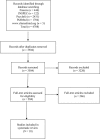Online and Mobile Interventions for Problem Gambling, Alcohol, and Drugs: A Systematic Review
- PMID: 28649211
- PMCID: PMC5465385
- DOI: 10.3389/fpsyg.2017.00954
Online and Mobile Interventions for Problem Gambling, Alcohol, and Drugs: A Systematic Review
Abstract
Online interventions for gambling, alcohol, and illegal drug related problems have been developing at a fast pace over the past decade. Yet, little is known about the content and efficacy of interventions provided entirely online for reducing drug/alcohol use and gambling, or about the characteristics of those who use these interventions. This systematic review aims to describe the characteristics of online interventions, their efficacy, and the profile of their clientele. Documentation was mainly obtained through four scientific databases in psychology, technology, and medical research (PsychINFO, MedLine, Francis, and INSPEC) using three keywords (substances or gambling, intervention, Internet). Of the 4,708 documents initially identified, 18 studies meeting admissibility criteria were retained and analyzed after exclusion of duplicates and non-relevant documents. No study in the review related to problem gambling. The majority of interventions were based upon motivational or cognitive-behavioral theoretical approaches and called upon well-established therapeutic components in the field of addictions. The participants in these studies were generally adults between 30 and 46 years old with a high school education and presenting a high risk or problematic use. More than three quarters of the studies showed a short-term decrease in use that was maintained 6 months later, but only two studies included a 12 months follow-up. Online interventions seem promising and appear to meet the needs of participants who are in the workforce and seeking help for the first time. Long-term efficacy studies should nonetheless be conducted.
Keywords: Internet; addiction; alcohol; drug; gambling; mobile application; psychological intervention.
Figures
References
-
- Ajzen I. (1991).The theory of planned behavior. Organ. Behav. Hum. Decis. Process. 50, 179–211. 10.1016/0749-5978(91)90020-T - DOI
-
- American Psychiatric Association (2013). Diagnostic and Statistical Manual of Mental Disorders, 5th Edn. Washington, DC: American Psychiatric Association.
-
- Andersson G., Carlbring P., Lindefors N. (2016). History and current status of ICBT, in Guided Internet-Based Treatments in Psychiatry, eds Lindefors N., Andersson G. (New York, NY: Springer; ), 1–16.
-
- Andrewartha L., Dowling N. (2006). Pre-treatment attrition for problem gambling, in Psychology Bridging the Tasman: Science, Culture and Practice, ed Katsikitis M. (Sydney, NSW: Australian Psychological Society; ), 16–20.
-
- Barak A., Hen L., Boniel-Nissim M., Shapira N. (2008). A comprehensive review and a meta-analysis of the effectiveness of Internet-based psychotherapeutic interventions. J. Technol. Hum. Serv. 26, 109–160. 10.1080/15228830802094429 - DOI
LinkOut - more resources
Full Text Sources
Other Literature Sources
Miscellaneous


